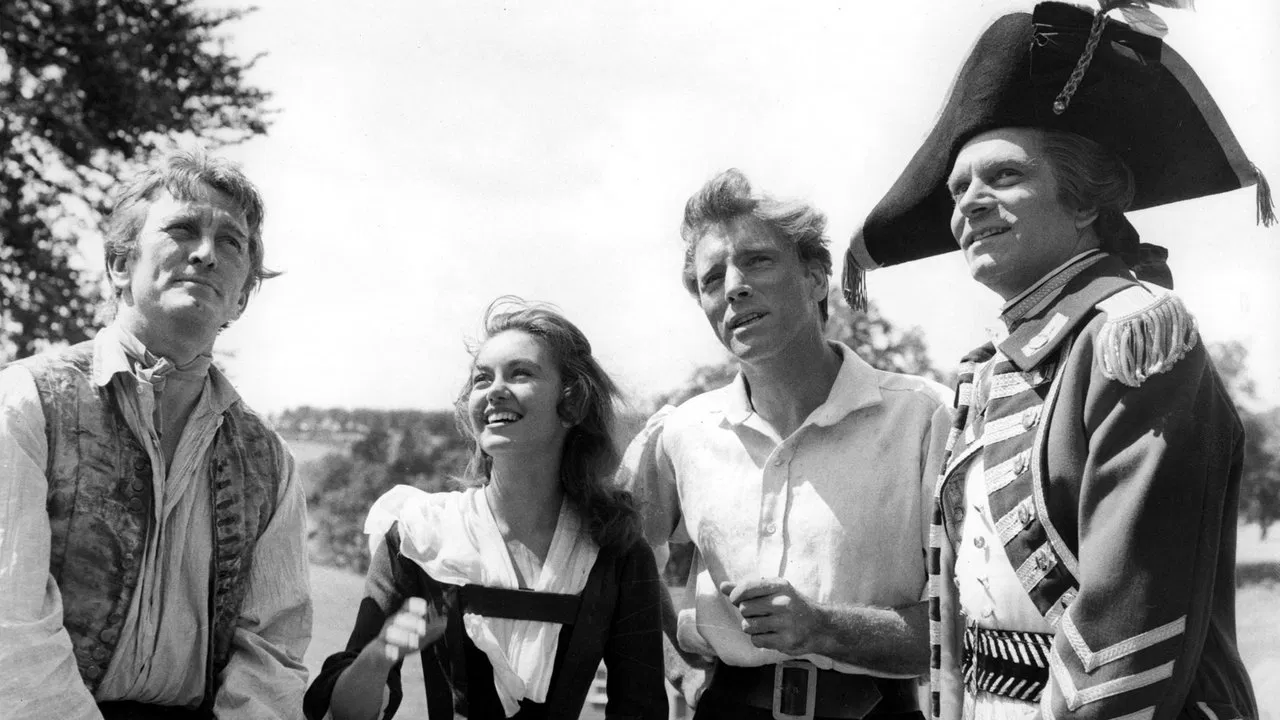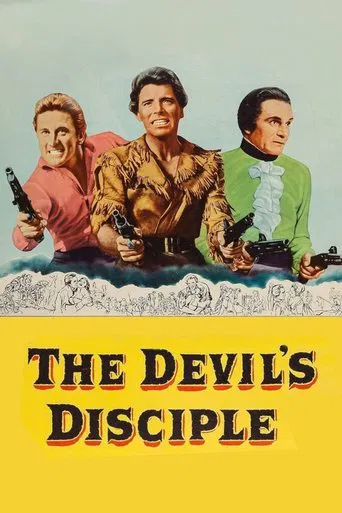

This film is very entertaining but Shaw apparently missed the boat in researching Burgoyne's character (he obviously didn't read Burgoyne's journal or other material from the era which was no doubt too hard to track down back then).In this film Burgoyne is skittish and worried, rebuffs an officer about risking his men's lives using bayonet charges. In fact, Burgoyne was the leading proponent of the bayonet, even issuing an order that the soldiers were not allowed to fire their weapons without a direct order and that the supremacy of the British bayonet was to be impressed upon them. He'd had experience fighting the Spanish in an earlier war and was not a reluctant warrior.Also in the movie he's a bit timid because he states the rebels have them outnumbered by six to one. They were in fact outnumbered (probably more like four to one, although accounts from the time vary) but he did not know it because his Indian scouts had deserted after Bennington and he had trouble getting intelligence reports. In fact, he led the last battle as a reconnaissance mission to test the enemy's strength, and had promised his subordinate generals that he'd (finally) give in to their pleas to retreat if the enemy was too strong. That recon mission proved to be his final reckoning in the war.But watch the movie anyway. It's very entertaining.
... View MoreHaving seen The Devil's Disciple on a venue that runs films which have fallen into the public domain, I wonder how anyone could have let copyright lapse on such an intriguing, yet quirky, film as this. With it's triumvirate of strong leading men, and an interesting script, this movie should be much more well known. And with it's rather oddball presentation it's surprising that it does not have cult status.The live action segments are excellent, and there is no slack in the acting or direction. However, some poor soul made the bizarre decision to interject little Rankin-Bass type puppet animation segments at nearly random moments, thoroughly negating - each time - all the dramatic momentum that has been accumulated up to that point. The animated segments are well done, and moderately amusing in and of themselves, yet completely incongruous to the tone of the surrounding film.These segments are, however, a minor flaw when compared with the greatest drawback of this movie. I am referring to the character of Judith Anderson, our hero's wife. She is, without a doubt, the most annoyingly fickle and foolish female character that I can recall having ever witnessed in any film; and very nearly the most hysterical as well. Not too far into the story I began to get the feeling that I would very much like to slap her. Halfway through the film I was consciously rooting for each of the male leads to take a turn slapping her. By the end of the film I was convinced that everyone in the film should have slapped her, and probably the crew as well! The only thing that made this character bearable was the calm, good-natured presence of Lancaster, Douglas, and Olivier.Now, this is not intended to denigrate Miss Janette Scott, who portrayed Mrs. Anderson. On the contrary, she did a remarkable job of making this over-the-top hysterical woman seem real. A lesser actress might have easily come off as overly melodramatic and phony in such an extreme performance. Her skill in the performance is the reason that we want to slap her. Kudos to Janette Scott. It is my opinion that almost everyone who watches this film will, in fact, want to slap her. Be prepared.
... View MoreSynopis: Light hearted comic look at General Burgoyne's invasion of New York State in 1777-1778 pokes endearing fun at British and American perceptions of each other. Marching south into New York State, General John Burgoyne (Sir Laurence Olivier) is executing the evilest person he can find in every town he passes. In this manner the General expects to stifle resistance from the Devil's Disciples, Rebel irregulars impeding his path. However as this plan isn't working, the General decides to execute instead the most virtuous man he can find, Reverend Anderson (Burt Lancaster), the local minister, leaving untouched the local reprobate and likely rebel, the self-proclaimed Apostle of Satan, Dick Dungeon (Kirk Douglas) whose very mother would like to see hanged. Rescued from a cruel fate, the impeccable Reverend Anderson turns out to be the Rebel leader Burgoyne sought all along. A delightful comedy well played by the giants of the English language cinema, Lancaster-Olivier-Douglas, could have only be the product of the whimsical genius of George Bernard Shaw, the Dublin born playwright who may have known little of the Revolution but whose clever invention caught the English and American perceptions of each other, a Burgoyne imprisoned in his own insufferable, imperious, impervious arrogance fighting Americans who will use apparent sanctity as a cover for their nefarious clandestine behavior. Major Swindon: But what about history, sir? General John Burgoyne: History, sir, will tell lies, as usual!This is purely fiction you may believe every word of it. It is too bad that the celebrated playwright Shaw who died in 1950 did not live to see this production. Contrary to Shaw, there is little evidence that the British sanctioned whole scale war crimes prior to the Battle of Saratoga. Indeed, the British pardoned virtually every American civilian who requested. As fortunes of war changed, the same civilians applied for Congressional pardons, so much for the fortitude of American non-combatants or the lasting success of deluded British commanders in the war for hearts and minds. The incident described in Devil's Disciple may be a Bardic remembrance of the scalping of Jenny MacCrae, a Tory lass remade by American propaganda into a resolute Rebel and whose very name became the battle cry of Saratoga and the title of a popular American song. Throughout the 19th century the name of "Sweet Jenny MacCrae" was oft invoked by polite society in lieu of indulging in profanity. As British and American passions subsided a century and a half later when the play was written, the Jenny MacCrae incident may no longer have been politically correct. It took the genius of Shaw to hide the story in a parable which reminds both sides who they really are. George Bernard Shaw Devil's Disciple hardly ranks with the best of the Dublin born playwright George Bernard Shaw, one of the most prolific playwrights in the English language. Famous for the remark that a common language is the chasm which separates England from America, Shaw may have known little about the Revolution but knew much about the character of the peoples whose world views collided.
... View MoreWhen George Bernard Shaw wrote `The Devil's Disciple', it was not one of his favorite plays. In fact, he seldom allowed for it to be performed, while he was alive. By any standard, it does not stand up as well as some of his other plays (`Pygmalion', `Candida', `Saint Joan', `Major Barbara', `Arms and the Man', etc.). This film is rewarded with a screenplay that while uneven at times, maintains the spirit and flavor of Shaw's writing. It is also the beneficiary of three strong performances by Burt Lancaster, Kirk Douglas, and especially, Laurence Olivier. It is rumored that with most of the Lancaster-Douglas films, that the two men would not decide until just before production started, which role they were going to play. In this film, it wouldn't matter. Built on a premise of role reversal, the actors and their roles are interchangeable. In fact, I think it would have been interesting if the movie were filmed twice. Once with the actors in their current roles, and another version with them swapping identities.Both give marvelous performances. Kirk Douglas starts out a little too broad, but you are instantly drawn to him as a man/patriot. His trial scene with Olivier is the highlight of the film. With Lancaster, you can see the foundation work being prepared for his role of `Elmer Gantry'. His fight scene with the soldiers has just the right amount of humor and slapstick. And is anyone as striking as he is when he first enters in his buckskins?But it is Olivier who steals this film. I have read how he did not really enjoy working for Lancaster and Douglas, and so he more or less threw his lines away without much conviction. If that is true, it worked for this picture. He has by far the best lines, best characterization, and straight-men to play off of (especially Harry Andrews). Nice work is also turned in by George Rose.`The Devil's Disciple' is by no means a classic. But it is a must see for film buffs, who want to see three terrific performances, and a pair of friends who obviously had a great chemistry between them, as well as a lot of fun working together.7 out of 10
... View More